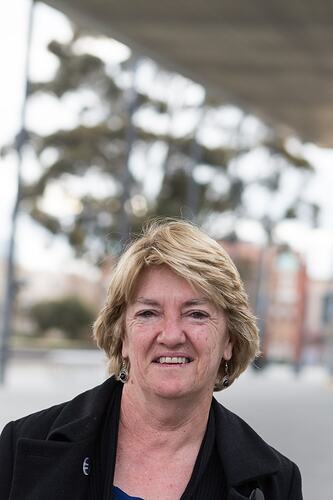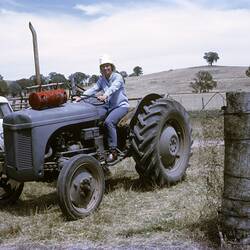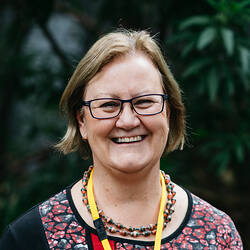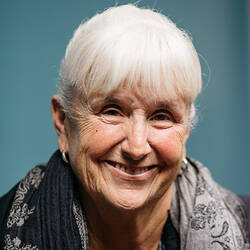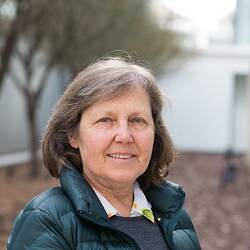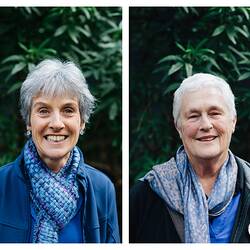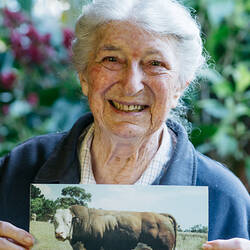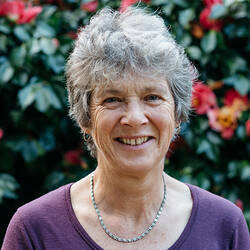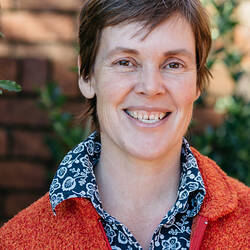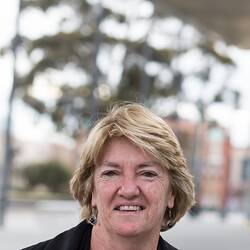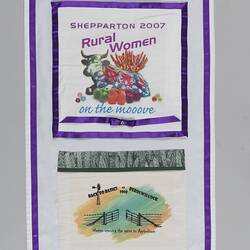Margaret Alston is an academic at Monash University and has authored several books that focus on the role of farming women in Australian agriculture. She has argued that Australian farming women have been neglected, ignored and silenced in mainstream narratives about rural Australian life and she has urged media, government and researchers to take more notice of what she calls the 'hidden heart of rural Australia' (1995). Margaret was active during the Rural Women's Movement of the 1980s-1990s and her academic works have directly informed policymakers and encouraged rural women to continue lobbying and networking. She has been involved firsthand with a number of rural women's networks including the Women on Farms Gatherings, the Foundation for Australian Agricultural Women, and the Rural Women's Policy Unit.
The following excerpts were taken from an interview with Margaret Alston for the Invisible Farmer Project recorded by Curator Catherine Forge at Museum Victoria on 9 September 2015.
When did farming and agriculture start to factor into your life?
Well I was born into a farming family and in fact, my father's family had been on that block, for some time. So my whole world was farming from the time I was born and there were a number of occasions when I was working, there was lots of things that we did on the farm. It was very labor-intensive in those days, even to the point where you had to fill bags with wheat rather than - there were no trucks to take wheat to town, and one of my jobs was, from about seven, was to sew the top of the bags. So just things like that, helping out in the wool shed; farming was everywhere and everything.
Who worked on your family farm?
After my father died, things changed quite a lot and, and one of the issues that reared its head for me was how my mother had to negotiate the system when she became a widow. She went to the bank to get a loan to pay death duties and was told that she had to wait till my brother turned eighteen. That's when I started being crushed by agriculture and what it meant, and it didn't really occur to me that I could inherit until I got much older. There were six of us but my brother and I were quite close and he inherited the, the farm eventually, but we'd had a similar upbringing. That's what motivated my writing I think, that experience of my mother and how she had to negotiate all of that, and her borrowing money privately to pay the death duties and then going off and doing an Ag course at TAFE at night, so that she could run the farm. So I have a lot of respect for my mother. It actually makes me quite teary how she managed that process and you know, that's, that opened my eyes very early to the gendering of farming and that there's, there's, there's often people will say I'm a fifth generation farmer, I actually find that really offensive. Really offensive, because only a male can say that. So I actually have a lot of issues with a whole lot of things around farming.
What was it about farming that inspired you to want to go and buy one yourself?
Oh, it's too innate, it's too embedded in my soul. And I think that has a lot to do with that experience of always having it as a child and then suddenly having it threatened and watching my mother's humiliation, I just find, I don't know I just feel like it's, it's almost like it's in your soul but it's also going against the system and trying to change that system and obviously you can see that in my books. It's this constant analysis of how this could possibly happen to women every generation, and every time, and trying to analyse that in a way that people can understand and take some sort of strength from. But I had to, I had to understand my mother's experience. That was the big thing, that that could happen to a woman who was, I think, widely respected, had done everything associated with life that she should have done, but being treated with such disrespect.
Do you have any comments about feminism in the context of the Rural Women's Movement?
I did a social work degree and that university experience was important because it exposed me to feminist literature in my Arts subjects and the books of the 1970s were coming out, a whole lot of feminist texts. Anne Summers opened the first Women's Refuge near Sydney Uni and there were big things happening, so it was like I was drawn into a wider feminist framework from that point. But then I married at the end of University and went back to my local rural area and was completely disabused. The first week that I was there, two things happened. I went to set up an account to get the papers delivered, 'cause we were on a farm and they had mail deliveries and that's how the papers came out. And the newsagent said he wouldn't establish the account unless my husband signed it. So I was brought back into that sphere that in which my mother had lived. The second thing, it was the same week, we met my brother in town and went to a pub to have a, a drink and they wouldn't serve us because they said they wouldn't serve women in hotels and so we had to leave. It really rattled me, and so that sort of got me into this issue around Women in Agriculture, and there wasn't a feminist framework in that field yet. You know, it was like I'd brought this knowledge but it had no place there and it really destabilised me for quite a long time actually.
Can you tell me about your how you started your academic work on rural women?
I had four children and when I had my third child I realised that I could get pretty stuck in this thing, so I went back to University. I went and did a Masters by correspondence and my thesis was on rural women and that's when I started trying to get my head together. I then I did my PhD, which I did through the University of New South Wales and that PhD is actually the basis for 'Women on the Land' and I turned that into a book after. By this stage I was starting to frame this idea of a feminist background.
Let's talk a bit more on this feminist framework and how you envisioned that it could be helpful or work in the favour of rural women?
Well I think it provided an analysis for their invisibility - this sense of being so disempowered and yet accepting that was something that I'd struggled with for years. I also exposed the patriarchal nature of farm inheritance and of the way rural communities operated in making decisions, things like when meetings were held, you know, how those things all shut women out. So there was a whole lot involved in that but also, in my thesis, I documented and interviewed over sixty women on farms across very diverse areas. Their issues were so similar, not only that disempowered position but they were also moving from that traditional role into the workforce and that wasn't being acknowledged. One of the areas that I'd interviewed in had been in significant drought and women in that community were travelling, you know, hundreds of miles each week just to get to work, so they had enough money to buy groceries and I could see that this was going to be written out of history if we didn't look at this patriarchal element of what was going on in farming. So by exposing that - and my work even today is still trying to bring acknowledgement from farmer organisations for how women are contributing to agriculture through their off farm income because it's been going on forever as I actually think it's even pre women going off farm because they were having their small industries and all that in the 1950s, I know my mother was and this economic contribution had also been ignored. So, it's been going on forever probably and yet there's this understanding of Australian agriculture that it's male, males handing onto males, but a family farm by its very nature cannot operate without a family. And so what I was trying to do was expose the contribution of women. And I think the time was right when Australian Woman in Agriculture started to develop.
How did you yourself get involved in the Australian Rural Women's Movement?
I was in New South Wales so I wasn't a central part of that group that formed the International Conference etc. I went to the Conference but I certainly felt I was a stronger part after that because I was so inspired by what they were doing. But yeah, the time was right, the reason the time was right is that we had now an educated group of women and from the time that Whitlam had opened up education for women like me, you started to get women going to University and, so that was one of the things. You also had challenging times, there was drought and there was, you know, a lot of farms weren't making enough to support families. So that's the second thing, and then you had this activism that built a head of steam and you had the politicians in place in Victoria. Because Victoria was central to it, it couldn't have happened anywhere else. You had Joan Kirner giving it impetus - she turned up at meetings, she did things for the people, for the women that made them feel that what they were doing was important. So I think you can never discount what she did. That gave enormous political patronage, as it were, and legitimacy to what was going on in Australian Women in Agriculture.
What were some of the highlights for you of this time?
I'll just take you to 1995. We ran the first National Rural Women's Forum and we deliberately held it in Parliament House in one of the big Senate rooms and we invited eighty women from across Australia. So we targeted women who were leaders in various organisations from across country, rural-based organisations, and brought them together to Canberra and I introduced Carmen Lawrence, she did the opening address and congratulated us. She was very positive. So that National Rural Women's Forum resulted in a document that was widely disseminated in government and it had an overarching statement, 'rural women demand rights, recognition and respect'. It was really powerful and we were very inclusive. We wanted women to have their voices heard and the ultimate document is, I mean you read it now and it's quite revolutionary.
You mentioned recognition. How important was it that rural women get recognised and what did they want to get recognised for?
Okay, well this was this big push to acknowledge that women were part of farming and agriculture, whether it's in direct hands on service or through their funding input to agriculture. I still maintain that Australian agriculture is subsidised by women and I've said that as recently as a couple of months ago, in a talk. Women are contributing so much to Agriculture that's not acknowledged and I think it's about acknowledgement. You always hear about the male dominated efficient agriculture. It's not efficient. It's totally dependent on women earning an income. So our call was about recognising what women were doing and not treating them as these silent things that kept the generational progress going. One of the really important organisations that supported the growth of it though was the ABC and the ABC Rural Women of the Year Award, again gave us another platform to build what we were trying to build. It recognised women, it was about recognition.
How important is it that we document and record the voices of rural women?
Well I think it's just recapturing women's history. I mean I talked about my mum, I haven't talked about my grandmother who came out as a young Irish child and married my grandfather. Someone like my brother can say he's a fifth generation farmer, but there's a grandmother there and there's a mother there, so I think it's really important to fill in those gaps, and to really to be able to say these women contributed an enormous amount to Australian agriculture as it today. If we lose sight of that, I think we've lost something really, really critical to Australian identity. It's really important that we acknowledge those women because I think in the book I call them the 'silent shadows' of history, and I want to bring them into the light a bit more. It's really important to me.
More Information
-
Keywords
Agriculture, Farming, Rural Women, Rural Industry, Rural Victoria, Women's Associations, Conservation, Sustainable Agriculture, Women's Movement, Gender Roles
-
Localities
-
Authors
-
Contributors
-
Article types
